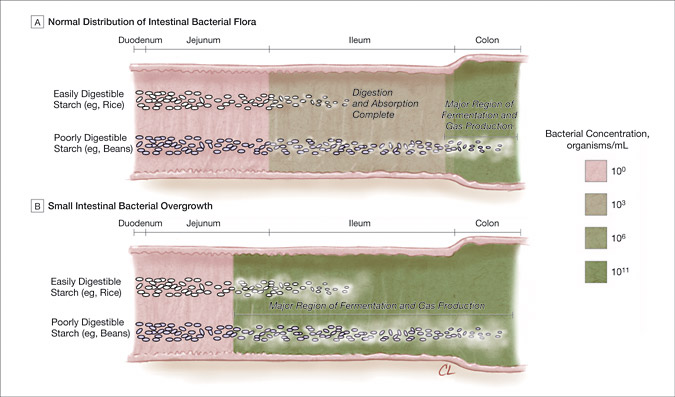
These pages are here to provide open notes and facts as I come across them in my research on Irritable Bowel Syndrome (IBS), Ulcerative Colitis (UC) and Crohn’s Disease (CD). Most of them will find their way into future articles but feel free to follow up on them yourself. If any of this helps you in the writing of an article, please provide attribution to GutTalk.com.
There is no significant reduction in the absorption of fats in patients with Ulcerative Colitis (UC) so fats should not be considered for diet modification.
Progression of symptoms of small intestine bacterial overgrowth (SIBO). “Most often, symptoms include combinations of abdominal pain and cramping, diarrhea (which can sometimes be bloody), dyspepsia, gas, and weight loss.”
Treatment includes, increase of fats and reduction of carbohydrates in diet, broad spectrum antibiotics at half dose, probiotics, steroids, bowel flushes and surgery in extreme non-responsive cases.
– “Bacterial Overgrowth” – Vanderhoof et al – Oley Foundation Website
Lactase deficiency may arise as a result of mucosal damage.
There was no difference in response between lactose and glucose.
Most patients showed prompt clinical improvement on withdrawal of carbohydrate from the diet.
Possible effects of Small Intestine Bacterial Overgrowth (SIBO) and its relationship to Irritable Bowel Syndrome (IBS) and Ulcerative Colitis (UC)
“Nearly all of the symptoms and findings of IBS are wholly consistent with SIBO”
“For many patients, the association between sugar intolerance and IBS may be related to bacterial overgrowth rather than true sugar intolerance.”
Many other observations and statistics
Protein malnutrition does not increase likelihood of bacterial transmigration (SIBO) but it does decrease the lactobacilli population.
